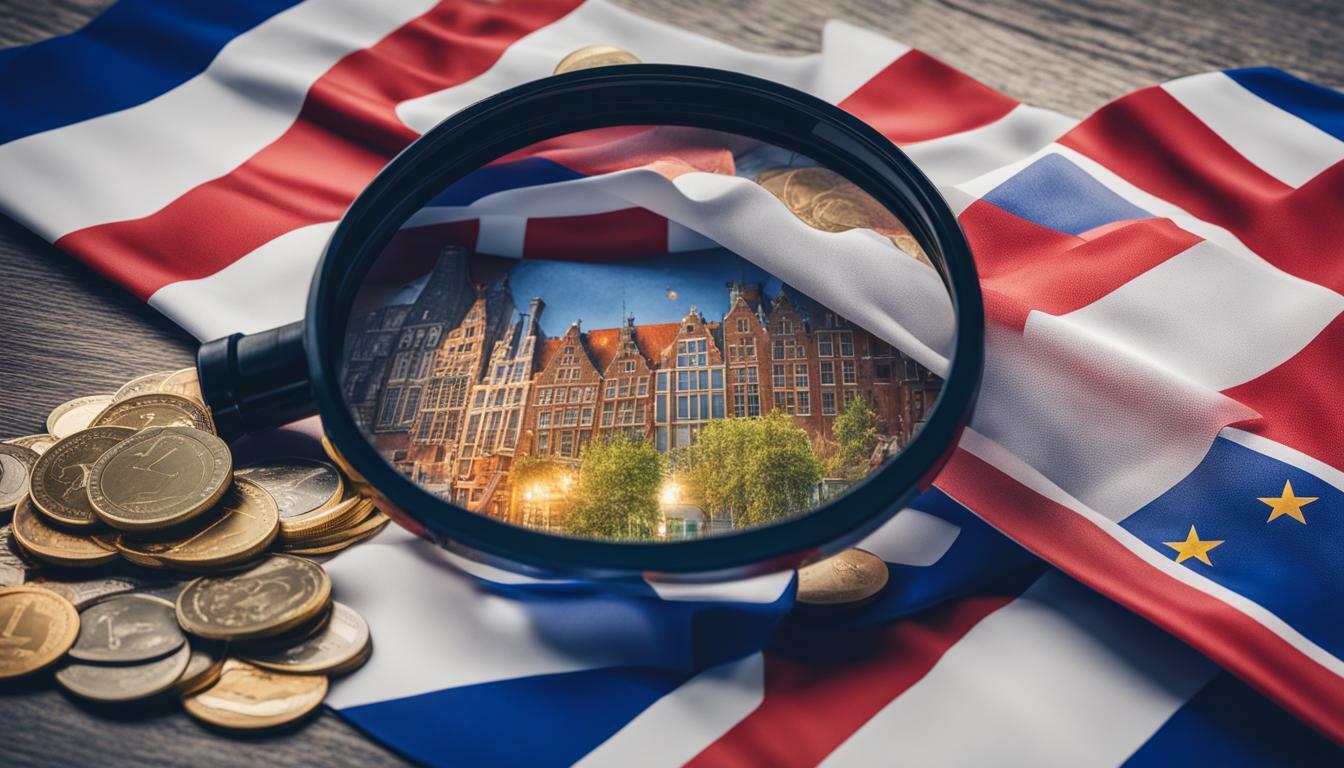Uncovering the Costs of Permanent Residency in Netherlands
Applying for permanent residency in the Netherlands comes with certain costs that applicants need to be aware of. From application fees to immigration expenses, it is important to have a clear understanding of the financial commitments involved. In this article, we will explore the various costs associated with obtaining permanent residency in the Netherlands, providing you with the information you need to make informed decisions.
Key Takeaways:
- Applying for permanent residency in the Netherlands involves a series of costs, including application fees, immigration fees, and administrative charges.
- Non-EU/EEA citizens must first obtain a temporary residence permit before living in the Netherlands for five continuous years, making them eligible to apply for permanent residency.
- Securing a job and applying for a work visa is often the easiest way to move to the Netherlands, but it comes with its own costs, such as job search expenses and visa application fees.
- The Netherlands is known for its high living costs, with expensive cities and a high tax payment system. Applicants should consider these factors when planning their finances.
- While finding a job in the Netherlands can be challenging due to competition, there are advantages to living in the country, including beautiful scenery, a good work-life balance, high-quality healthcare, and a low crime rate.
Understanding the Permanent Residency Application Process
Before delving into the costs, it’s important to understand the application process for permanent residency in the Netherlands.
As a non-EU/EEA citizen, the first step in moving to the Netherlands is obtaining a temporary residence permit. This document allows you to live and work in the country while you work towards obtaining permanent residency. To apply for a temporary residence permit, you will need to submit the necessary documents, which may include proof of employment or sponsorship, a valid passport, and proof of sufficient financial means to support yourself during your stay. The application fees for the temporary residence permit vary depending on your specific situation and category of residence.
Living in the Netherlands for five continuous years is a requirement for becoming eligible to apply for permanent residency. During this time, you must adhere to the country’s laws and regulations, including paying taxes, contributing to social security, and integrating into Dutch society. Once you have reached the five-year mark, you can begin the application process for permanent residency, which includes submitting additional documents, attending interviews, and paying the necessary fees.
Table: Application Fees for Permanent Residency in the Netherlands
| Application Stage | Application Fee |
|---|---|
| Temporary Residence Permit | Varies depending on residence category |
| Permanent Residency Application | €1,345 (as of 2021) |
It is important to note that these fees are subject to change and may vary depending on individual circumstances. Additionally, there may be other costs associated with the application process, such as translation services, document authentication, or legal consultation fees.
In conclusion, understanding the permanent residency application process is crucial before considering the costs involved. From obtaining a temporary residence permit to living in the Netherlands for five continuous years, applicants must navigate various requirements and fulfill financial obligations. By being familiar with the process, individuals can plan and budget accordingly to achieve their goal of establishing permanent residency in the Netherlands.
Obtaining a Temporary Residence Permit
To begin the journey towards permanent residency in the Netherlands, non-EU/EEA citizens must first obtain a temporary residence permit. This permit allows individuals to live and work in the country for a specific period of time. The application process involves several steps and requires the payment of certain fees.
When applying for a temporary residence permit, applicants must pay the required immigration fees. These fees may vary depending on the specific type of permit being applied for and the duration of stay. It is important to note that these fees are non-refundable, so it is crucial to ensure that all required documents are submitted correctly.
In addition to the immigration fees, applicants may also incur other expenses during the application process. These expenses may include fees for document translation, medical examinations, and legal representation if needed. It is advisable to budget for these additional expenses to avoid any financial surprises.
| Expense | Cost |
|---|---|
| Immigration fees | Varies depending on the type and duration of the permit |
| Document translation | Approximately $50 – $100 per document |
| Medical examinations | Approximately $200 – $300 |
| Legal representation | Varies depending on the complexity of the case |
It is important to note that obtaining a temporary residence permit is just the first step towards permanent residency in the Netherlands. Individuals must also fulfill the requirement of living in the country for five continuous years before being eligible to apply for permanent residency. During this time, applicants should be prepared for the costs of living in the Netherlands, including accommodation, daily expenses, and taxes.
Living in the Netherlands for Five Continuous Years
To qualify for permanent residency in the Netherlands, non-EU/EEA citizens must fulfill the requirement of living in the country for five continuous years. During this time, applicants will need to cover various costs associated with their daily lives, including housing, healthcare, and transportation.
Let’s break down some of the key expenses you can expect when living in the Netherlands for five years:
1. Housing Costs
The cost of housing in the Netherlands can vary depending on the location. For example, renting an apartment in Amsterdam, known for its high living costs, will be more expensive compared to other cities. On average, you can expect to pay around €1,500 to €2,000 per month for a one-bedroom apartment in the city center. In smaller towns or in less popular areas, the prices can be significantly lower.
2. Daily Expenses
The cost of daily expenses, such as groceries and dining out, can also add up. While the price of groceries may be similar to other European countries, dining out in restaurants can be relatively expensive. On average, a meal in a mid-range restaurant will cost around €15 to €20 per person. However, cooking at home and shopping at local markets can help reduce these costs.
3. Transportation
Transportation costs in the Netherlands can vary depending on your location and how frequently you travel. Public transportation, such as buses and trains, are widely available and can be a cost-effective option. A monthly transportation pass for unlimited travel within a specific city can range from €50 to €100. If you prefer using a car, keep in mind that fuel and parking costs can be quite high, especially in major cities.
4. Healthcare Expenses
The Netherlands has a high-quality healthcare system, but it’s important to note that health insurance is mandatory for residents. The cost of health insurance can vary depending on your age, coverage preferences, and the insurance provider you choose. On average, you can expect to pay around €100 to €150 per month for basic health insurance coverage.
While the costs of living in the Netherlands for five years may seem high, it’s essential to consider the advantages that come with it. The country offers a high standard of living, beautiful scenery, excellent work-life balance, and a safe environment with a low crime rate. Taking these factors into account and carefully planning your finances will help ensure a smooth transition to permanent residency in the Netherlands.
| Expense | Average Cost |
|---|---|
| Housing | €1,500 to €2,000 per month |
| Daily Expenses | Varies |
| Transportation | €50 to €100 per month |
| Healthcare | €100 to €150 per month |
Finding a Job and Applying for a Work Visa
The easiest way to move to the Netherlands and work towards permanent residency is by finding a job and applying for a work visa. The process may seem daunting, but with careful planning and research, it can be navigated successfully.
Here are the key steps to consider:
- Job Search: Begin your journey by searching for job opportunities in the Netherlands. Online job portals, professional networks, and recruitment agencies can be great resources in your quest to find suitable employment.
- Work Visa Application: Once you have secured a job offer, you will need to apply for a Dutch work visa. This involves gathering the necessary documents, such as your employment contract, valid passport, and proof of health insurance. Consult the official Dutch immigration website for the detailed requirements.
- Registration at the Gemeente: Upon arrival in the Netherlands, it is essential to register your residence at the Gemeente (municipality) within a certain period. This process involves filling out paperwork and paying administrative fees.
It is important to note that the job market in the Netherlands can be competitive, especially for non-EU/EEA citizens. Be prepared to face challenges and demonstrate your unique skills and qualifications to stand out among other applicants.
While moving to the Netherlands for work presents its own set of challenges, there are numerous advantages to be enjoyed. The country boasts stunning scenery, a strong work-life balance, excellent healthcare, and a low crime rate. Additionally, the Dutch language, although not mandatory, can be helpful for better job opportunities and communication with locals.
| City | Monthly Rent (1 Bedroom Apartment) | Price of a Meal (Inexpensive Restaurant) |
|---|---|---|
| Amsterdam | $1,600 – $2,500 | $15 – $20 |
| Rotterdam | $1,200 – $1,800 | $12 – $18 |
| The Hague | $1,200 – $2,000 | $12 – $17 |
Living costs in the Netherlands, especially in cities like Amsterdam, can be high. Rent prices vary depending on the location, with the city center being more expensive. Dining out at inexpensive restaurants can also add up, so it’s wise to budget accordingly.
Summary:
Moving to the Netherlands and working towards permanent residency requires finding a job and applying for a work visa. It is essential to conduct a thorough job search, gather the necessary documents for the work visa application, and register your residence at the Gemeente upon arrival. While there may be competition in the job market, the Netherlands offers several benefits, including a high quality of life, beautiful landscapes, and excellent healthcare. However, it’s important to be aware of the high living costs, particularly in cities like Amsterdam. Budgeting and planning are crucial for a successful transition to life in the Netherlands.
Costs of Registering Residence at the Gemeente
Upon arrival in the Netherlands, applicants must register their residence at the Gemeente, which comes with certain costs. The Gemeente is the municipality where individuals are required to register their address and obtain a BSN (Burgerservicenummer) or citizen service number. This registration is crucial for accessing public services and benefits, opening a bank account, and receiving healthcare.
The registration fee at the Gemeente varies depending on the municipality. Some Gemeentes charge a fixed fee, while others calculate it based on the number of people registering or the size of the household. It’s essential to check with your local Gemeente to determine the exact cost. Additionally, there might be additional administrative fees for specific services, such as obtaining a proof of residence document or requesting duplicate copies of your registration.
When registering at the Gemeente, you will need to bring certain documents, including a valid passport or ID, proof of address, and any relevant immigration documents. These documents may need to be translated into Dutch or English by a certified translator, which could incur additional costs. It’s advisable to prepare these documents ahead of time to ensure a smooth registration process.
| Gemeente | Registration Fee | Additional Administrative Fees |
|---|---|---|
| Amsterdam | €35 | €15 for proof of residence document |
| Rotterdam | €17.90 | €6.05 for duplicate copies of registration |
| The Hague | €26.50 | €10 for translation of documents |
Please note that the above table is for illustrative purposes only, and the actual costs may vary depending on the municipality and specific circumstances. It’s always advisable to contact your local Gemeente directly or visit their website for the most up-to-date and accurate information.
Registering your residence at the Gemeente is an essential step in the process of establishing yourself legally in the Netherlands. While it may involve certain costs, it is a necessary investment to access the various benefits and services that come with permanent residency in this beautiful country.
Considering the High Living Costs in the Netherlands
It’s essential to take into account the high living costs in the Netherlands when considering the overall expenses of permanent residency. With its reputation as a prosperous and developed country, it’s no surprise that the cost of living in the Netherlands is considerably higher compared to many other countries. Expensive cities, high taxes, and daily expenses can significantly impact one’s financial planning.
The first aspect to consider is housing. Rent prices in Amsterdam, for example, can be quite steep, especially in popular neighborhoods. The location and size of the property play a significant role in determining the monthly rent. It’s worth researching and exploring options in different areas to find a balance between price and convenience. Additionally, purchasing a property in the Netherlands can come with substantial costs, such as property transfer tax and legal fees.
When it comes to daily expenses, expect to pay more for groceries, dining out, and transportation. While the quality of goods and services is generally high, prices can be higher compared to other countries. It’s advisable to plan a budget for everyday necessities and explore cost-saving options, such as shopping at local markets or cooking at home. Public transportation is efficient and widely used in the Netherlands, but commuting expenses can add up, especially if you live outside major cities.
The Dutch tax system is another factor to consider. Taxes in the Netherlands can be quite high, particularly income tax. It’s essential to understand the tax regulations and plan accordingly to avoid any surprises. Consulting with a tax professional can help navigate the intricacies of the tax system and ensure compliance.
| Expenses | Average Costs |
|---|---|
| Rent (1-bedroom apartment in Amsterdam) | $1,700 – $2,500 per month |
| Groceries | $200 – $300 per month |
| Dining out | $15 – $30 per meal |
| Public transportation | $100 – $150 per month |
| Income tax | Progressive rates up to 49.5% |
While the costs of living in the Netherlands may present challenges, the country also offers numerous advantages that make it an attractive destination for many. Beautiful scenery, a good work-life balance, high-quality healthcare, and a low crime rate are just some of the benefits that come with permanent residency in the Netherlands. Additionally, while knowledge of the Dutch language is not mandatory, learning it can open doors to more job opportunities and enhance communication with locals.
In conclusion, moving to the Netherlands requires careful planning and consideration of the high living costs. From housing expenses to everyday necessities and taxes, it’s important to budget and prioritize expenses accordingly. With proper financial management and an understanding of the costs involved, applicants can make a smooth transition to their new life in the Netherlands.
Job Market and Competition in the Netherlands
Finding a job in the Netherlands can be challenging due to the competitive job market, and applicants should consider any associated costs or hurdles. The country attracts a large number of skilled professionals from around the world, resulting in fierce competition for job opportunities.
To increase their chances of finding employment, non-EU/EEA citizens are advised to research the job market thoroughly and understand the specific requirements and qualifications preferred by employers in their desired field. It is essential to tailor their resumes and cover letters to align with Dutch standards and highlight relevant skills and experiences.
Networking plays a crucial role in the Dutch job market, and applicants are encouraged to attend industry events, career fairs, and professional networking sessions to expand their connections and improve their prospects. Additionally, learning the Dutch language can provide a significant advantage, as many employers prefer candidates who can communicate effectively in both Dutch and English.
| Challenges | Costs/Hurdles |
|---|---|
| High competition for job openings | Investing time and effort in job search |
| Different application process and requirements | Cost of translating documents and qualifications |
| Preference for candidates with local experience | Investing in internships or volunteer work |
“The Dutch job market is highly competitive, and it can be challenging for non-EU/EEA citizens to secure employment. However, with determination, preparation, and a strategic approach, it is possible to overcome these obstacles and find fulfilling career opportunities in the Netherlands.”
Job Opportunities in High-Demand Fields
While competition is fierce across sectors, some industries in the Netherlands have a higher demand for skilled professionals. These include technology and IT, engineering, finance, healthcare, and agriculture. Applicants with qualifications and experience in these fields may have a better chance of finding job opportunities and securing higher salaries.
It is important to note that the cost of living in the Netherlands, particularly in cities like Amsterdam, can be high. Rent prices vary depending on the location, and meals, transportation, and other daily expenses can add up. Therefore, applicants should consider these financial aspects when planning their move and negotiate a competitive salary that can cover their living costs comfortably.
Overall, while the job market and associated costs in the Netherlands may present challenges, the country offers a host of advantages such as its beautiful scenery, work-life balance, high-quality healthcare, and low crime rates. With careful preparation and research, non-EU/EEA citizens can navigate the job market and secure rewarding employment opportunities in the Netherlands.
Advantages of Moving to the Netherlands
Despite the costs and challenges, moving to the Netherlands has its advantages, which applicants should consider. This beautiful country is known for its stunning scenery, with picturesque canals, charming windmills, and tulip fields stretching as far as the eye can see. The Netherlands offers a high-quality work-life balance, with shorter work hours and an emphasis on leisure time. This allows residents to fully enjoy the vibrant cultural scene, explore the country’s rich history, and spend quality time with family and friends.
In addition to the work-life balance, the Netherlands boasts an excellent healthcare system. Dutch healthcare is known for its efficiency and accessibility, ensuring that residents receive the medical care they need. With a low crime rate, the Netherlands is considered a safe and secure place to live, offering peace of mind to those who choose to make it their home.
While the Dutch language is not mandatory, learning it can be advantageous for job opportunities and integration into the local community. The Netherlands is a multicultural society, with English widely spoken, making it easier for non-Dutch speakers to navigate daily life.
| Advantages of Moving to the Netherlands |
|---|
| Scenic beauty and cultural heritage |
| Work-life balance and leisure opportunities |
| High-quality healthcare system |
| Safe and secure living environment |
| English widely spoken in a multicultural society |
Despite the advantages, it is important to be aware of the high living costs in the Netherlands. The major cities, such as Amsterdam, are particularly expensive, with rent prices varying depending on the location. Additionally, meals and daily expenses can add up. Proper financial planning is crucial to ensure a comfortable lifestyle in the Netherlands.
In conclusion, moving to the Netherlands offers a multitude of advantages, including its stunning natural beauty, excellent work-life balance, high-quality healthcare, and safe living environment. While there are costs and challenges to consider, careful planning and preparation can help individuals make a smooth transition and enjoy the benefits of living in this fascinating country.
Conclusion
Applying for permanent residency in the Netherlands involves various costs and careful financial planning. However, with the right preparation, it can lead to a fulfilling life in this beautiful country.
Moving to the Netherlands as a non-EU/EEA citizen requires obtaining a temporary residence permit, which comes with its own application fees and expenses. After living in the country for five continuous years, you can then apply for permanent residency, which may incur additional costs such as immigration fees.
The easiest way to move to the Netherlands is by finding a job and applying for a work visa. This process includes searching for employment, incurring costs associated with a job search, and going through the application process for a Dutch work visa. Once you arrive, you will need to register your residence at the Gemeente, which may involve administrative fees or charges.
It’s important to note that the Netherlands is known for its high living costs. Cities like Amsterdam can be particularly expensive, with varying rent prices depending on the location. Daily expenses, such as meals, can also add up. Additionally, the Dutch tax payment system can be demanding, so financial planning is crucial.
While finding a job in the Netherlands as a non-EU/EEA citizen can be challenging due to competition, there are advantages to moving to this country. The Netherlands offers beautiful scenery, a good work-life balance, high-quality healthcare, and a low crime rate. Although learning the Dutch language is not mandatory, it can be beneficial for job opportunities and communication.
In conclusion, applying for permanent residency in the Netherlands requires careful consideration of the costs involved and financial planning. However, with the right preparations, you can enjoy a fulfilling life in this beautiful country.
FAQ
Q: How much does it cost to apply for permanent residency in the Netherlands?
A: The costs associated with applying for permanent residency in the Netherlands include application fees, immigration fees, and any other expenses applicants may incur. The exact amount can vary depending on individual circumstances.
Q: What is the process of applying for permanent residency in the Netherlands?
A: To apply for permanent residency in the Netherlands, non-EU/EEA citizens must first obtain a temporary residence permit, live in the country for five continuous years, and then apply for permanent residency. The process involves meeting specific requirements, submitting required documents, and following the general timeline of the application process.
Q: How do I obtain a temporary residence permit in the Netherlands?
A: To obtain a temporary residence permit in the Netherlands as a non-EU/EEA citizen, you will need to go through the application process and pay the associated fees. The application fees and other expenses may vary depending on your situation.
Q: What are the costs of living in the Netherlands for five continuous years?
A: Living in the Netherlands for five continuous years before applying for permanent residency comes with general living expenses. These include accommodation costs, daily expenses, healthcare, education (if applicable), and taxes. The exact costs will depend on individual lifestyle choices and location within the country.
Q: How do I find a job and apply for a work visa in the Netherlands?
A: The easiest way to move to the Netherlands is by finding a job and applying for a work visa. This involves searching for job opportunities, applying for suitable positions, and going through the visa application process. Costs related to job search and visa application, such as fees and transportation expenses, may apply.
Q: What are the costs of registering residence at the Gemeente?
A: When moving to the Netherlands, it is necessary to register your residence at the Gemeente (municipality) upon arrival. This may involve administrative fees or charges, depending on the specific Gemeente and their policies.
Q: What are the living costs like in the Netherlands?
A: The Netherlands is known for its high living costs, with expensive cities and a high tax payment system. Daily expenses, such as rent, food, transportation, utilities, and leisure activities, can be relatively expensive. It is important to budget and consider these costs when planning to live in the Netherlands.
Q: What is the job market like in the Netherlands?
A: The job market in the Netherlands can be competitive, especially for non-EU/EEA citizens. Finding a job may take time and effort, and there may be additional costs related to job search activities, such as networking events, resume services, and transportation to interviews.
Q: What are the advantages of moving to the Netherlands?
A: Despite the costs and challenges, moving to the Netherlands has its advantages. The country offers beautiful scenery, a good work-life balance, high-quality healthcare, and a low crime rate. These factors contribute to a high standard of living for residents.
Q: Is learning the Dutch language mandatory?
A: Learning the Dutch language is not mandatory for obtaining permanent residency in the Netherlands. However, it can be beneficial for job opportunities and communication within the local community. Many Dutch people speak English, but having some knowledge of Dutch can enhance your experience in the country.
Q: What is the cost of living like in Amsterdam?
A: The cost of living in Amsterdam is generally high. Rent prices in the city can vary depending on the location and size of the accommodation. Meals and other daily expenses may also be relatively expensive. It is important to research and budget accordingly if you plan to live in Amsterdam.
Source Links
- https://www.expatica.com/nl/moving/visas/permanent-residence-netherlands-108418/
- https://ind.nl/en/fees-costs-of-an-application
- https://visaguide.world/moving-to/netherlands/







